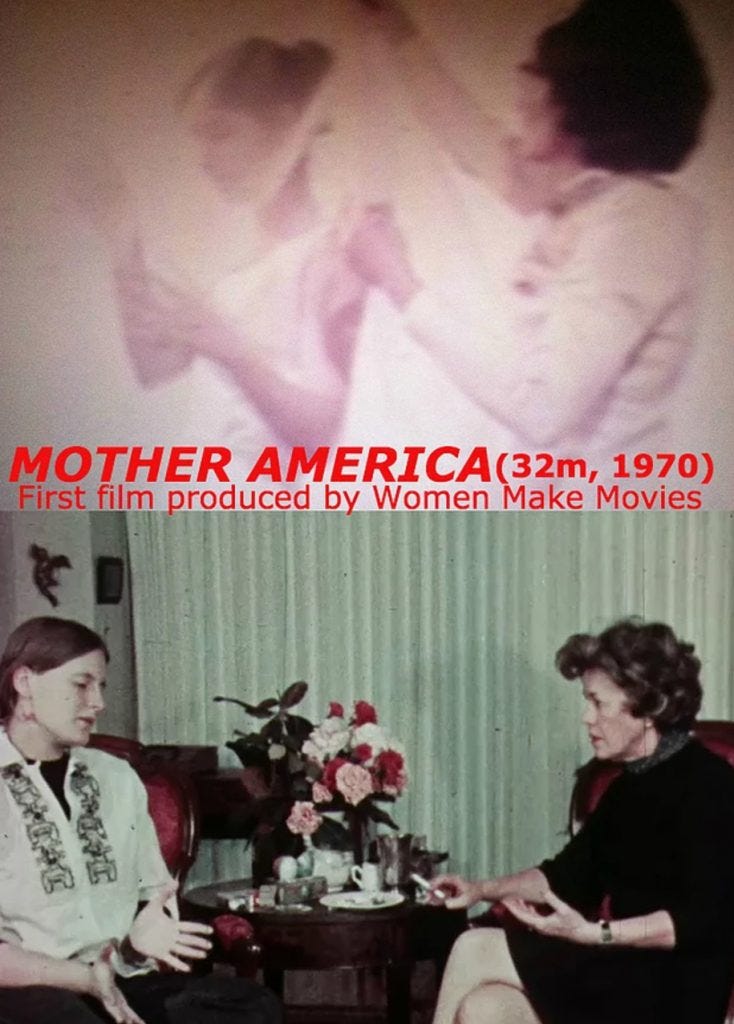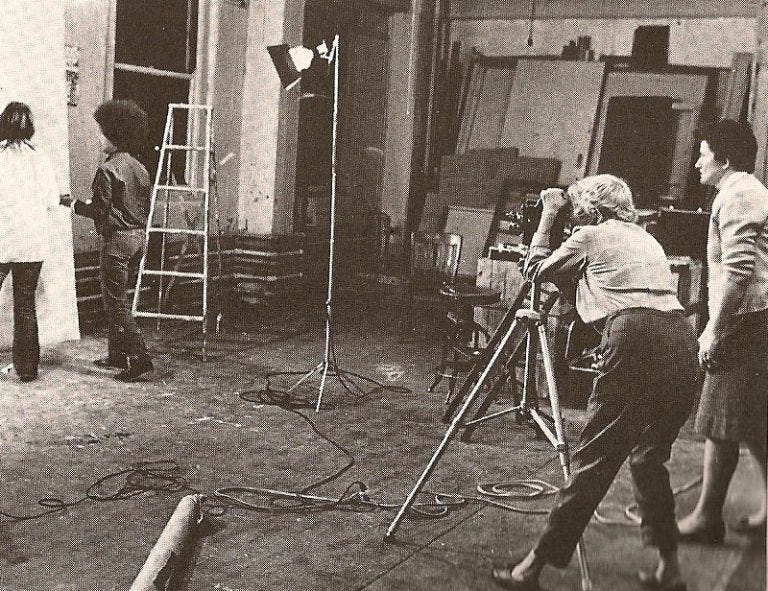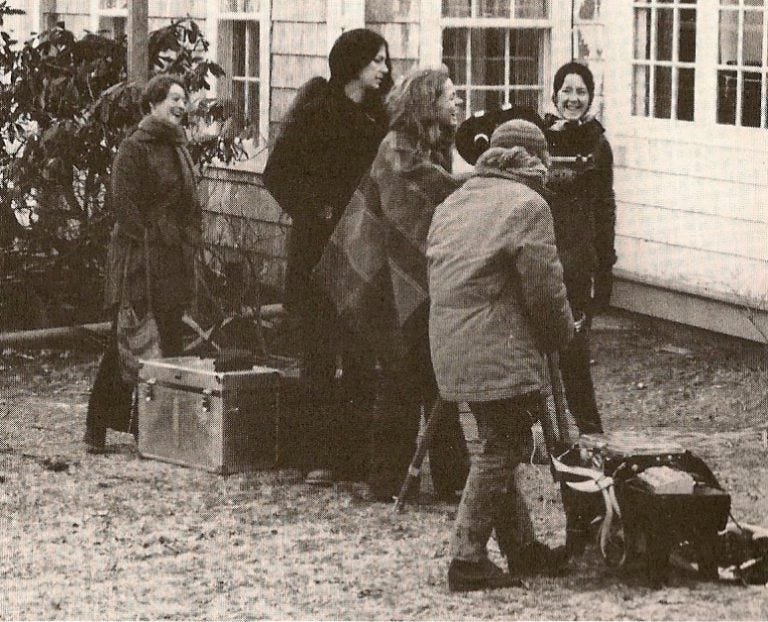 |
| Ariel Dougherty |
Interview by Alexandra Hidalgo
You have a long history of making films and supporting women filmmakers, what made you interested in the intersections between the moving image and feminism?
It was the spring of 1969. I was with 100 college-mates in the middle of an eleven day sit-in in our college administration building, when a recent graduate brought several films from Community Newsreel. One of the films was Make Out, but another of the films really got to me. A woman was ironing. Suddenly I started to see the preconceived roles we women were expected to fulfill. They were vastly different from my own ideas of myself. Already I was teaching kids filmmaking. I began to see that I could tell our own stories on film.
If today it is unusual to be a woman behind the camera, back in the 1970s when you were a pioneer feminist filmmaker, it was outright revolutionary for you to pick up a camera. Can you tell us what made you want to do so and what the experience was like?
We really learned from doing. Being a teacher of filmmaking for youth helped to see my own identity in the process. We were lucky to have a few role models around us like Deedee Halleck and Shirley Clarke. The women’s liberation movement gave up an unheralded boost. We were not only empowering ourselves, but other women along with us. We worked with only all-women crews and we were all learning as we went along. It was an exceedingly exciting and creative time of bravada and experimentation.
You’ve also had a long career as a producer, most recently working with Lynn Hershman on her 2010 documentary Women Art Revolution. Can you provide some advice to filmmakers working today on how to sustain our passion and interest in the moving image over decades?
Go with your instincts, what feels and makes the most sense. It doesn’t always work, but you have to keep at it, experimenting and not giving up. In seeing the very first clips of Lynn’s film I was deeply struck by Janine Antoni’s experience in 1989 when there was no documentation about four key women performance artists at one of the U.S.’s premiere art colleges! How could it be that women’s work from just a decade earlier was completely unknown and not on the record somewhere? Or another moment in the film, when Sheila de Bretteville weeps at the uphill struggle that it was to keep women’s cultural organizations going. The wish, the imagination was so vast, impelling us to create, but the support was so lacking that structures were shaky under our feet.
Not only have you worked behind the camera, but you also co-founded Women Make Movies, one of the most important and long-lasting institutions for women filmmakers. What gave you the idea of creating a distributor for films made by women and what do you think accounts for its longevity?
Actually Women Make Movies has a deeper, longer history than being solely a distributor. First, in 1969, we were a production arm emerging out of the women’s liberation movement. Between then and 1972 we produced four films. We worked with all-women crews on these projects and constantly strove to not only tell women’s stories and to bring new visions to the silver screen, but we also put production skills into women’s hands.
When Sheila Paige and I tried to get these works into distribution, educational film distributors of the day would tell us: “But women aren’t an audience.” Also, we had been teaching kids filmmaking. By 1972 we thought to put our same teaching experiences into giving women a community to make their own cinematic stories. We also wisely knew that feminism would not always be fundable. So we needed an earned income program, voilá, distribution! Women Make Movies continues to serve a very specific service bringing a wide, global range of women’s cinema to audiences. There really is nothing else quite like it. It is very possible that WMM is amongst the most self-sustaining organizations to have emerged from the women’s movement. I think too, the name is emphatic. It is a full sentence. It is more than simply an organization. It is an idea.
You’re currently running a GoFundMe campaign to help you cover the cost of attending the Women’s Media Summit in Providence, Rhode Island. Can you tell us what the campaign will cover and why it is important for you to attend this event?
There are no feminist media policy makers in all the U.S.. That is shocking. We need to change this picture. If there can be 70 or so policy developers within the violence against women, surely we can afford a dozen or so feminist policy analysts who will chip away at the overt sexism in all kinds of media by changing laws, creating new incentives, demanding equality.
Policy on media from a feminist analysis is absent from the picture. I can help bring that view into focus. My long experience working in feminist media will assist. Any contributions of money will help me with my expenses traveling from New Mexico. Because I have a limited income and no outside funding to cover the trip, the GoFundMe will make it into less of a hardship for me to participate in the Summit.
There has recently been a global movement trying to find ways to transform our sexist film industry. Are there particular approaches and initiatives that you deem to be particularly effective?
Crowdfunding has been a huge boom for feminist directors. What is great about this development is that it means control of the project remains in the hands of the director. Challenge is always how to teach the crowd! Also it is hard to do for yourself. Another wonderful development is how the Bechdel-Wallace test by volunteer theatres in Sweden has improved the content bringing more women’s stories to the screen.
Is there any other advice you have for those trying to make the world a more egalitarian place through making and discussing moving images?
Add more women’s cinema stories to the mix. We may all have one or more. And we need to help audiences find women’s films. Much more there!!
-----------
To learn more about Ariel’s work and activism, visit her website.
-----------
View Alexandra's profile here.
Originally published at agnesfilms.com on March 30, 2017, where it was copy- edited and posted by Sabrina Hirsch.



Comments
Post a Comment